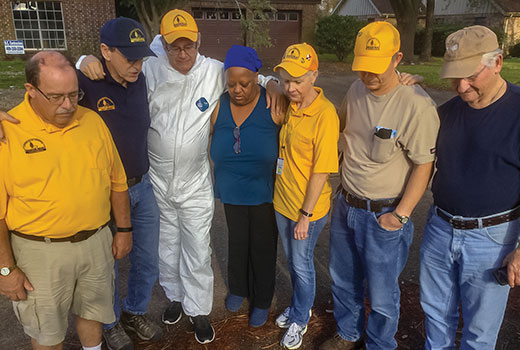Although a variety of ministry activities spring to mind upon hearing the words “disaster relief” or “collegiate ministries,” a singular fidelity to sharing the gospel emanates from the core of two Baptist entities responsible for those particular mission fields in South Carolina.
More than a humanitarian agency that assists victims of floods, storms and tornadoes, South Carolina Disaster Relief zeroes in on the spiritual and emotional needs of disaster victims. Likewise, in seeking to be not just a church away from home for college students, Baptist Collegiate Ministry takes the gospel to spiritually hungry young adults who are ripe for the hearing.
Collegiate Ministry
Ken Owens says that at any given moment, one in every 20 people living in South Carolina is studying on a college campus.
“What a critical and strategic group that 5 percent represents,” said Owens, director of Baptist Collegiate Ministry for the South Carolina Baptist Convention. “It’s a group filled with sharp minds and boundless capabilities, but many of them are searching for meaning and truth.”
“The spiritual need on today’s campus is great, but so also are the opportunities and possibilities of what God can do as we seek to saturate and transform every life on campus with the hope of the gospel.”
During the most recent school year, BCM’s evangelistic outreach resulted in 406 South Carolina college students becoming followers of Jesus. Also, in 2017, more than 600 BCM students served in short-term summer or semester mission causes in the state and around the world, sharing the gospel with nearly 11,000 people, leading to 1,104 professions of faith.
In addition to its own mission work, BCM provides “critical support and avenues” for campus-focused churches to have missional and evangelistic connections “to reach even more students with the gospel,” said Owens.
In quoting the late Bill Bright, founder of Campus Crusade for Christ, Owens said, “If we can win the university today, we will win the world tomorrow.”
“Evangelistic efforts on college campuses may be the most strategic and critical ministry in which churches can engage,” he said. “Without question, students who find the hope of the gospel today will be leaders and shapers of tomorrow’s church and culture.”
Disaster Relief
Last year, more than 500 South Carolina Disaster Relief volunteers mobilized to help respond to Hurricane Matthew. Also, following localized storms and a tornado, volunteers manned 867 chainsaw jobs, prepared 113,405 meals and helped complete 126 flood-recovery projects.

Mud-out team volunteers from South Carolina take time out to pray with a Texas resident after Hurricane Harvey devastated the Houston area last fall.
But those numbers only tell part of the story. SCDR volunteers also made 2,976 chaplaincy/ministry contacts and recorded 12 professions of faith.
“Our focus is on both the physical need as well as the spiritual and emotional need of those we are serving,” said Randy Creamer, director of South Carolina Disaster Relief. “If we do not offer the hope we have in Christ, we are no different than any other secular organization that’s just trying to do good things.”
Creamer said SCDR volunteers are cautious not to take advantage of the vulnerable or to proselytize. “It’s a balance wherein we depend on the Holy Spirit’s leadership,” he said.
Over the last several weeks, several South Carolina volunteers have traveled to Connecticut to assist in recovery efforts after spring tornadoes. “This response has proven to be some of the most fertile spiritual soil our volunteers have ever seen,” said Creamer. “Our teams have contributed to bringing help, hope and healing into that part of New England.”
“Being a witness is not just a leader thing or special assignment for chaplains — it is for every believer,” Creamer said.
He said catastrophic events often awaken people to the knowledge that material possessions and self-interest “leave us quite empty and prompt us to think beyond our own little worlds.”
“Disaster relief is simply a bridge into people’s lives,” he said. “We enter only when invited.”
